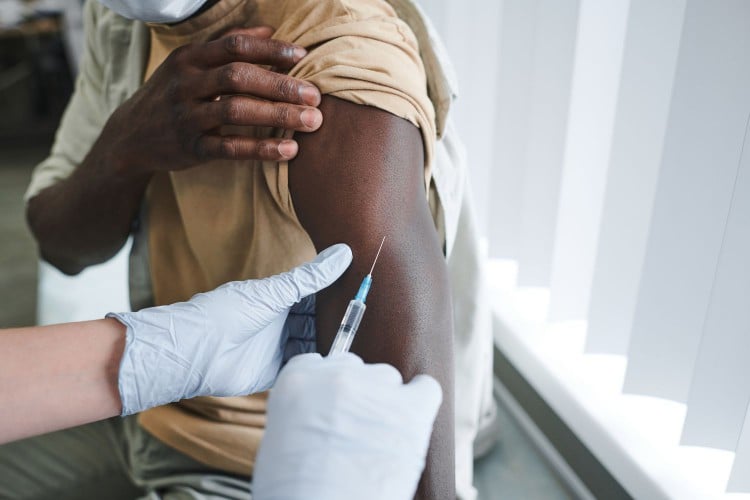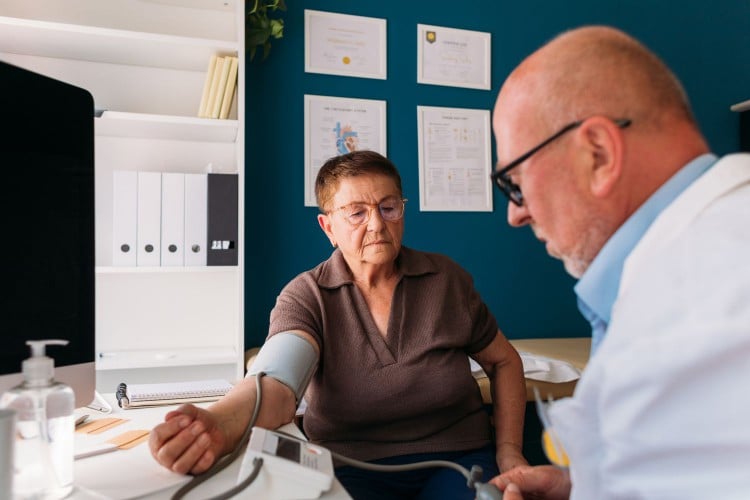- As cold weather approaches, health authorities are extra cautious of COVID-19, flu, and RSV spreading.
- New vaccines have come out for each of the illnesses, with availability often depending on how high-risk an individual is.
- While the COVID-19 vaccine and the flu shot may be administered on the same day without issue, some experts warn that getting an RSV vaccine on the same day as the other injections could cause negative side effects.
It’s time to start considering which vaccines you need to avoid cold-weather illness.
New COVID-19 variants have emerged, causing a recent spike in cases and hospitalizations. Meanwhile, flu season is swiftly approaching. And RSV is top of mind thanks to a recent FDA approval for a new vaccine.
With new developments in vaccine accessibility and technology, experts are hopeful that we might avoid another tripledemic heading into the winter months.
Here’s what to expect for fall vaccine availability, recommendations, and how to choose the right vaccines for your family.

Getty Images / mediaphotos
The Flu Vaccine Changes Every Year, Just Like the Flu
Each year, infectious disease experts monitor the flu virus across each season and hemisphere. In anticipation of the virus and season, different flu vaccine strains are selected to make up the vaccine that is available for the upcoming flu season.
In the United States, flu season typically starts in the fall and peaks during the winter months.
The flu vaccine, like other vaccines, is made from either a live, but very weak (attenuated) form of the virus, an inactivated (no longer live) form of the virus, or a synthetically grown dose of the part of the virus structure that the immune system attacks, Mark Loafman, MD, a practicing family medicine doctor in Chicago, told Health.
“All three versions stimulate essentially the same immune response one would get if they had and recovered from influenza infection,” he explained, “and all three work very well, but live attenuated vaccines generally produce the strongest immune response and are preferred for those at higher risk of influenza complications.”
Loafman recommends everyone six months and older get an annual flu vaccine.
Children aged eight or younger who have not yet received any flu vaccine will need to receive two doses, but adults, and children who have received a flu vaccine at some point in their life just need one dose per flu season.
People 65 and older can request a stronger dose of the flu vaccine which is tailored to offer them more protection for their weaker immune systems. It can take up to two weeks after injection for protection to begin.
“The reason the vaccine is recommended for everyone is based on the high levels of infection,” said Loafman.
According to the Centers for Disease Control and Prevention (CDC), an estimated 365 million flu-related illnesses occurred during the 2019–2020 flu season. From 2010–2020 the flu caused about 12,000–52,000 deaths annually.
When Should You Get the Flu Vaccine?
September or October is the ideal time to get your flu shot. Antibody levels start to rise about two weeks after vaccination, so an early fall vaccination date allows you to reach peak antibody levels by the time cases start to occur in significant numbers later in the year.
For most people, protection from the flu lasts for roughly six to eight months, with antibody levels decreasing toward the end of that timeframe.
“Effectiveness also depends on how well the vaccine, which is developed each year in anticipation of the flu virus strains expected in the fall, matches the actual strain of flu viruses that appear,” said Loafman.
According to the CDC, general side effects from the flu vaccine are mild and generally only last a few days. These symptoms can include swelling or soreness at the injection site, a low-grade fever, nausea, muscle aches, or fatigue.
“One important fact about side effects is that the flu shot does not cause the flu,” said Loafman. “However for it to be effective it must generate an immune response and, depending on how brisk that response is in a particular individual at that particular time, there can be minor side effect symptoms.”
Where To Get a Free Flu Shot—With or Without Insurance
New COVID-19 Boosters Are Approved
Since the first Coronavirus vaccine became available in late 2020, pharmaceutical companies have worked to provide up-to-date, readily available vaccinations.
As COVID-19 continues to mutate, boosters are available to provide protection from new variants.
The latest booster is designed to target the XBB.1.5 omicron subvariant. While the strain is no longer dominant, the booster can still protect against its circulating sub-variants, which are closely related.
Last week, the new booster received approval from the Food and Drug Administration, as well as a recommendation from the CDC.
“It is likely to be available in one to two weeks,” Janak Patel, MD, director of the Department of Infection Control & Healthcare Epidemiology at the University of Texas Medical Branch, told Health.
“However, many clinics and pharmacies may take additional days for procurement and internal distribution," he said. "So, practically, most people should have access through traditional channels by the end of September.”
The CDC recommends that every six months and older receive the COVID-19 vaccine. The highest priority should be for those aged 65 years and older, and those with underlying high-risk health conditions.
If you have already received your COVID-19 vaccine, you may be eligible for a booster. If you’re unsure if you qualify, it is best to consult with a doctor.
When Should You Get the COVID-19 Vaccine?
The CDC currently recommends that anyone over the age of six months old should get the COVID-19 vaccine if they have not already.
Patel explained that researchers are still learning how long a COVID-19 vaccine provides protection from the illness.
But, based on the percentage of U.S. adults who’ve been vaccinated and the percentage of U.S. adults who’ve had at least one COVID-19 infection, Patel estimates that “the annual vaccine strategy is likely to protect us for at least one year.”
He noted that it is still possible that after a few months of the vaccine, the protection may begin to decline, but may be still sufficient for overall population protection for about a year.
The COVID-19 vaccine has similar side effects to the flu vaccine. For adults, it can include pain, redness, and swelling at the injection site, fatigue, headache, chills, fever, and nausea. For infants side effects can include: pain in the leg or arm where the shot was given, swollen lymph nodes, irritability or crying, fatigue, or loss of appetite.
“Studies have shown that the new upcoming booster formulations have a side effect profile that is similar to the previous versions of the same vaccine type,” explained Patel. “If persons are reluctant to get a dose of an mRNA vaccine due to previous intolerable side effects, a protein subunit vaccine from Novavax is a good alternative. It has a lower side effect profile and still offers decent protection against severe disease.”
Getting the COVID-19 Vaccine: What to Expect Before, During, and After Your Appointment
What Is Needle Fatigue?
With all this talk about vaccines, you might find yourself suffering from what medical experts call ‘needle fatigue’. It can stem from a fear of needles or just the fatigue of getting shots.
First RSV Vaccine Shows Promise
While most people who contract RSV, or respiratory syncytial virus, will experience mild symptoms, infants and older adults can have more severe circumstances. This is especially true if there are other health factors at play that may be already weakening the immune system.
There is an RSV antibody vaccine available to high-risk babies; it requires monthly injections throughout the RSV season. A new RSV vaccine for infants—nirsevimab (Beyfortus)—became available in August 2023; it only requires one shot.
In May 2023, the FDA approved the first RSV vaccine for adults—Arexvy.
“This current vaccine uses a form of the F protein, preF, which RSV attaches to when it infects our bodies,” Preeti Parikh, MD, board-certified practicing pediatrician and executive medical director at GoodRx told Health.
“In the vaccine, this protein is mixed with an adjuvant, which helps trigger an immune response,” she said. “After injection, our bodies will produce antibodies in response to what it perceives as a threat and it will remember what preF looks like so it can better fight it in the future. This way our bodies are already prepped to stop an infection if we do encounter the virus.”
The nirsevimab vaccine is meant for newborns and infants up to 8 months of age who are about to face their first RSV seasons, as well as children eight to 19 months old who have high-risk conditions such as prematurity or cardiac condition, explained Parikh.
“This is important because RSV is particularly dangerous for young children and this vaccine can add valuable protection and reduce hospitalizations,” she said.
The Arexvy vaccine is designed for adults 60 and older, who have a heightened risk of developing a more severe infection.
When Should You Get the RSV Vaccine?
The CDC recommends for the 2023–2024 RSV season that anyone 60 years or older, with the recommendation of their healthcare provider, get the RSV vaccine if it is available to them.
Parikh explained that the Beyfortus vaccine may last through one RSV season, which is roughly five to six months, while the Arexvy vaccine may give you protection for two seasons.
The Beyfortus vaccine is typically well-tolerated among children, but, if your child is experiencing severe side effects like difficulty breathing or swelling in the face and throat, contact a healthcare provider immediately.
“After receiving the Arexvy vaccine you may experience side effects like fatigue, headache, muscle aches, and joint pain,” Parikh said. “Side effects should subside after a few days but if they don’t, you should contact your doctor.”
Can Adults Get RSV From Kids? Here's What to Know About This Contagious Virus
Getting the Flu, COVID-19, and RSV Vaccines at the Same Time
The COVID-19 and flu vaccines may be given at the same time with no issues. However, Parikh says that there is mixed data that the RSV vaccine and flu vaccine together may decrease the effectiveness of the vaccines.
Ultimately, it is best to speak with a healthcare provider and decide your own vaccination schedule, and whether or not you should get all three vaccinations on the same day.
Related pages
Therapy vs medication: Treatments for depression in heart failure
Share on PinterestExperts say therapy is an effective treatment for people with heart disease who al

Is It Bad to Drink Coffee on an Empty Stomach?
Many people believe drinking coffee on an empty stomach is unhealthy, but for most people, the pract

Pregnancy: How use of Tylenol can cause language delays in children
Share on PinterestResearchers are expressing caution about the use of Tylenol during the later stage

Drug ibogaine shows promise in treating traumatic brain injuries
Share on PinterestExperts say many combat veterans from the wars in Iraq and Afghanistan have trauma

Does Orange Juice Help With a Cold?
While orange juice may be a common drink if you have the common cold, it’s the vitamin C the drink c

COVID Might Help Trigger New-Onset High Blood Pressure
COVID might increase the risk of developing high blood pressure more than influenza, a new study has

